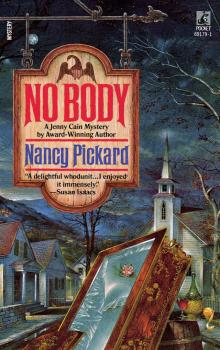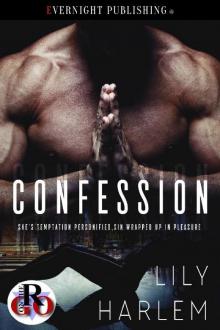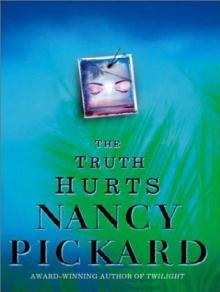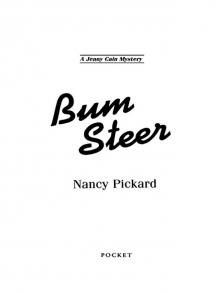- Home
- Nancy Pickard
The Blue Corn Murders Page 15
The Blue Corn Murders Read online
Page 15
“I hate surprises,” Madeline grumbled as she grabbed a good seat by a window. “I like schedules. Plans. Everything nice and predictable and going like clockwork.” She settled in, looking ill at ease. “Is this surprise going to involve missing any meals?”
“No way!” Susan Van Sant exclaimed as she got in and slammed the door on the passenger’s side of the front seat. “We know what the priorities are for this group. First food, then history.”
Even Madeline cracked a smile at that.
Naomi was their driver this morning. Genia and Lillian commandeered the back bench, leaving Teri and Judith to keep company with the irritable Madeline.
“Don’t even try to talk to me,” Madeline warned her seatmates. “You let me drink way too much beer last night, and the coffeepot was empty when I got to it, and I am holding every woman in this van personally responsible.”
“No coffee?” Up front, Susan glanced at Naomi. “Did Bingo leave early last night?”
Naomi grinned and shrugged.
Genia thought again how much they reminded her of two mischievous little girls this morning. She wondered what they were up to. But it was going to be an hour-and-a-half drive and a treacherous hike down the side of a mountain before she would find out. Gabby Russell was on her mind most of the way.
* * *
“This is the steepest path you’ll have to manage this week,” Susan called back over her shoulder to the other women. “Just take it slow, and watch out that you don’t put your whole weight on a loose rock, and you’ll be fine.”
She disappeared confidently over the lip of the cliff.
Genia, third in line behind Naomi, peered over when she reached the edge, and saw to her relief that the incline wasn’t so bad, really, only about fifty yards at about a twenty-degree slope. It would have seemed much steeper from the back of a horse. The narrow path wound around huge boulders and between trees. She glimpsed Susan, then lost sight of her again behind the first giant boulder. If there truly was any danger, Genia decided prior to planting her first footstep down the mountain, it would be the loose rocks in the path. A person who slid on one of those might keep on sliding—painfully—smack into one of those boulders or trees. Whether feet first or head first, it would be a plunge into disaster.
She started down with care.
It was awfully nice, she thought as she picked her way, to be doing this with a group of women who seemed to take for granted that she could manage quite well on her own. None of the younger ones said condescendingly, “Are you okay with this, Genia?” Nor did they demean her by grabbing her elbow to “help” her down. And it wasn’t because they were thoughtless, either, because at one time or another even Madeline had displayed the rather charming courtesy of younger women toward their elders. Teri and Judith insisted on ushering her into cafeteria lines in front of them; once Madeline got up and gave her the only available rocking chair; Naomi and Susan deferred to her in small ways that, Genia frankly admitted to herself she didn’t object to at all. Being sixty-four ought to carry some perks! And going first in line was a modest one, after all.
No, it wasn’t a lack of consideration that caused them to leave her to her own devices on the treacherous trail; rather, they seemed to believe in her strength and agility. Evidently they gave her credit for having enough intelligence not to start something she couldn’t finish. She hoped they were right!
“Oops!” she said.
Her moment of self-congratulatory reflection had cost her, by deflecting her attention from her right foot, which immediately and independently took the opportunity to slide out from under her. Genia grabbed hold of a tree branch, which luckily held firm.
“You okay?” inquired Teri, behind her.
“Fine,” she answered cheerfully.
Having circumnavigated a dozen shack-size boulders, ten minutes later Genia stepped onto flat rock—and gasped. It was just as well that nature had seen fit to plant a sturdy oak right at the place where her hand might reach out to steady herself, because otherwise a sudden wave of vertigo—and awe—might have sent her tumbling forward. And forward was not the direction of choice. “Forward” meant out and down, way way down to a dry river bed in a slickrock canyon below.
She felt as if she could see clear to her ranch.
As if that weren’t impressive enough, the view to her left took her so utterly by surprise with its perfect beauty that she felt moved nearly to tears.
It was a city.
A red, orange, and golden empty city.
Cunningly built brick by brick within the voluptuous inner fold of a stunning upward sweep and swirl of sandstone.
“I’ve never seen anything so architecturally perfect in my whole life,” Genia remarked out loud, an evaluation that included pyramids, palaces, and famous cathedrals. One by one the other women came up behind her, and one by one they also gasped, first at the altitude and then at the splendor to their left. Even Madeline exclaimed over it, although what she actually said was “Oh, my God, I think I’ve just found out I hate heights,” as if the city of stone didn’t impress her at all.
They entered the city by way of an easier incline and walked over to where Naomi and Susan were already waiting for them in front of the ruin of a three-story tower. It was only when they got really close that they realized that the artifacts scattered around the ancient “city” looked remarkably modern. Dots of bright color littered two thirds of the interior of the “city”: navy blue, fuchsia, chartreuse, mauve, along with clumps of black, brown, and army surplus green.
“I’ll be damned,” Madeline said in her dryly humorous way. “The Anasazi had bedrolls?”
They’d staged a modern “abandonment.”
This was their grand surprise and experiment, and it seemed to delight the women hikers. Madeline muttered, “You mean risking my life is not enough? I have to think, too?” But her posture and her face looked alert, giving away her true feelings of interest, Genia thought.
The sixteen teenagers, led by Jon Warren and their teachers, had artfully arranged a “scene” for the women to stumble upon.
“Pretend you are Richard Weatherill and his brother,” Susan said, as they gathered eagerly around her at the tower that stood at the edge of the empty city. “You’ve been out looking for lost cattle all morning, and you decided on the spur of the moment to climb down here, where you have never been before. And lo and behold! Look what you find!” Dramatically, smiling with pleasure at the eagerness on their faces, Susan swept her arms out wide. “You’re seeing what no white person”—she made a grimace of apology at Teri Fox—“what no non-Indian person has ever seen before. As far as I’m concerned, it’s the equivalent of stumbling across the Grand Canyon, or being the first European to see a living Indian village. Even now, knowing many other people have seen this ruin, it still takes your breath away, doesn’t it?”
Except for Madeline, they nodded in agreement.
“Well, think how you’d feel if you were the first person of your civilization to see this.”
Genia said, “I’d feel as if I had stumbled upon Shangri-la.”
Susan smiled at her. “I still feel that way, every time I see this place. It’s incredible, isn’t it? Okay now, to continue with our grand experiment: Remember what I’ve already told you about when the Weatherill brothers ‘discovered’ the ruins on Mesa Verde? They said it looked as if the people who had lived there had gotten up and left only the day before.”
“Just like this,” Teri said enthusiastically.
“Right. That’s what we hoped you’d say. Just like this. Your job is to play archaeologist. Pick your way carefully among the belongings that have been abandoned here. Take notes. Confer with one another. Pretend, if you possibly can, that you have never seen such things as backpacks or water bottles before, and work up some hypothesis about the kind of people who must have left such things. What did they eat? What were their sleeping arrangements? Did they do any sort of work? Can you determine how
many people might have lived here, and what the range of their ages might have been?”
“Wait, wait!” Lillian was scribbling notes on a pad she had pulled out of her backpack. “Talk slower, Susan!”
The archaeologist obeyed, ending her instructions with the words: “And finally, when did these people leave this site? What leads you to that conclusion? Why did they go, and where have they gone?” With a big grin, she released them, saying, “Go, junior archaeologists! You have one hour to work, and then the kids are coming back to join us for a seminar on the subject of the real abandonment.”
Genia felt absolutely inspired.
“I love this!” Lillian exclaimed to her, and she couldn’t possibly have agreed more. They decided to team up, one of them writing down notes and ideas, the other devoting all of her attention to the “evidence.”
“We need to count the sleeping bags!” Judith called to Teri.
“Pretend we’ve never seen a can of Coke before,” Lillian instructed Genia, who replied, “Look! Here’s a photograph tucked down into this bedroll! It looks like a family. That’s a good clue as to social arrangements within the tribe.…”
Madeline heard that and laughed. “Tribe? They grew an awful lot of polyester fiberfill, from the looks of things.”
“Good point, Madeline,” Teri called over to her from a few feet away. “What does that say about them, that they had the capacity to make synthetic fibers? And they had the ability to dye fabrics, too. Judith, write down all the colors you see!”
Madeline shook her head at them and wandered off deep into the empty city, poking about on her own in the far area where none of the modern “artifacts” had been scattered. A half hour later, she was way at the far edge when they heard her scream, bringing the grand experiment to an abrupt and hideous end. She was still screaming, standing on the edge of a deep, excavated hole in the ground, when Naomi reached her.
Twenty-three
She was screaming on the edge of a kiva, a traditional Native American pit that was dug out most likely for purposes of worship and community gatherings. They all hurried there and stared over the edge. And then Madeline’s screams were joined by others, for down on the dirt floor lay a body—what was left of it—once clothed in fringed leather pants and jacket. There was blood everywhere, well soaked into the pit, and the body wouldn’t have been recognizable if it weren’t for the remnants of the clothing, which they all recognized, and for the bloodstained long blond hair.
“Gabriella!” wailed Lillian, and she sank to her knees in the dirt above the hole in the ground. “Oh, my God in heaven!”
“My God,” breathed Judy, clutching her mouth, “what happened to her?”
“Naomi?” Teri seemed hardly able to breathe, much less to speak. “Could it have been that—mountain lion—you told us about?” She started to sob.
Genia thought the mutilated appearance of the body and the pattern of the dark blood smears on the walls of the kiva looked as if indeed an animal had attempted to drag Gabby’s body out of the hole. Then, giving that up as too heavy a job, it had torn off what it could manage to take away. Genia was horribly reminded of a calf that had fallen into a ravine on her ranch, and then been partly butchered and hauled away by coyotes. Her mind skittered from one seemingly irrelevant thought to another, frantically avoiding the truth that lay below in the kiva. Gabby would hate this, she thought desperately, this desecration of a sacred space, and with her own blood.
“A mountain lion?” somebody asked, sounding terrified.
“Something like that,” Naomi affirmed, and Genia saw her clamp down on her lower lip with her teeth, as if to prevent herself from succumbing to the same wracking sobs that were driving Teri to her knees at the edge of the kiva. As if she, too, could focus only on peripheral issues, she murmured, “If it is, if it’s killing people—”
She didn’t say any more, but Genia knew how to fill in the blank: If it was now a killer, it must be executed. Her brain fastened on the animal, avoiding its apparent victim. She recalled that Naomi had told them how bold that particular creature was; Genia had thought at the time that it sounded like a pet that had been let loose or escaped into the mountains. Or even a cat that had gotten loose from a wild animal reserve or a traveling show. She wondered if Gabby, in her naive way of viewing all things “natural” as also innocent, had approached it, exactly as they had been warned never to do.
“We have to get the police,” Naomi said, her voice sounding strangely cool and distant. “But we can’t leave her. Whatever killed her will come back for the rest of her body.”
“Oh,” Teri moaned, weeping at the kiva’s edge.
Her friend Judith patted her shoulder helplessly.
Madeline was quiet now, her face as pale as the bark of the aspen trees on the mesa above them. Suddenly she ran away from the dreadful sight, stumbling away as fast as she could move. Susan Van Sant was breathing hard, gulping air, as if she were going to be sick, and she, too, turned and walked away, and then sat down with her back to all of them.
“We’ll stay, Naomi,” Judith offered in a shaking voice.
Teri looked up at her as if she’d lost her mind. “No!”
“Yes!” Judith’s patting of her friend’s shoulder became a pressure, as if she were trying to hold Teri in place and keep her from going anywhere.
Genia, staring anywhere but down at the body, saw an unexpected flash of color at the bottom edge of the kiva, near a bloody hiking boot. “I’ll stay with them,” she said suddenly. And she remained adamant on that point, no matter how strongly the others urged her to leave with them. For she had seen what she suspected Judith had also seen. The flash of color, green and white, was a little shampoo bottle lying in the bottom of the kiva.
“I’ll stay,” Genia repeated firmly. “If the children return, I’ll keep them from coming down here and seeing this.”
“But they must have seen it!” Teri’s face was horror-stricken.
“No,” said Naomi, “look how their belongings stop before they get here.”
“Maybe that’s why they didn’t go any farther,” Teri argued, sounding frantic. “Because they saw this, and it scared them and they ran away, leaving everything behind them.”
“We would have heard from them, in that case.” Naomi was terse, her tone clipped. “We’ll be as quick as we can. Those of you who are staying, do you have water? Here, take my bottle, too. We won’t leave you alone here any longer than we have to.” To the others, she said commandingly, “Come on.” As they left, they all looked like ghostly images of the hearty women they’d been only a short time before.
“What if it comes back?” Teri wailed after them.
Naomi turned back to say, grimly, “Make noise. A lot of it. I don’t think he’ll bother you, with so many of you staying here. But if he shows up, don’t argue with him. Are you sure you want to do this? I’m having second thoughts about encouraging you to stay here. Gabby’s already dead, there’s nothing more we can do for her, and this isn’t worth risking your lives.”
“Oh, my God, I want to leave with you!” Teri started to scramble toward them.
“No,” her friend said through clenched teeth, reaching out a hand to physically restrain her, “you don’t.” With her other hand, she waved Naomi on. “Good-bye. We’ll be all right.”
If I leave, Genia thought unhappily, while she watched Naomi disappear with Lillian and Susan right behind her, will that shampoo bottle still be there when the police come?
She felt she couldn’t take the chance, although she couldn’t imagine what could be so important about it, or what it could possibly have to do with poor Gabby’s death. She didn’t even know why she felt so strongly that nothing must be disturbed, as if it were the scene of a crime of human against human, rather than an animal attack. The child must have tripped and fallen into the kiva, and then been attacked by some wild creature. What would a shampoo bottle have to do with that? Nothing, Genia suspected, but if that were
the case, why was the very sight of it enough to convince Judith to stay behind, when that was the last thing any of them surely wanted to do? And why would she want to stay when her friend was so frightened and distraught and eager to be gone from there?
With the others gone, Judith half-pushed, half-led Teri several yards away from Genia, and the two of them huddled together near another kiva, whispering. They weren’t otherwise trying to be quiet, however, and soon began pacing noisily up and down and clapping their hands in an obvious attempt to scare the invisible beast away.
Genia walked away, too, letting herself wearily down onto a rock where her legs could dangle and where she could gaze far out across the valley. She wasn’t frightened, at least not of the possibility that a mountain lion might spring at her back. Bold he might be, but never had she heard of a mountain lion so accustomed to human beings that he would purposely come down and walk among them—not even to retrieve his evening meal. Perhaps he was satisfied for now, satiated and sleeping it off, horrible though the thought was to her. But she had to admit it was also possible that he was hidden somewhere above them, watching and waiting for them to leave.
She shifted her awareness from lion to sunset.
A shaft of pain and grief stabbed through her as she realized that Gabriella had probably never seen this beauty in the daylight; it would have been invisible to her last night, merely an empty blackness beyond the edge of the city. This death could not have been the first one that this mysterious empty city had seen in the hundreds of years of its lonely existence. And when the people who built it had lived here, who among them had died here? Was there a woman, perhaps a grandmother, who had sat in this very spot with dismay in her heart, seeking solace from the peace and beauty spread out before her? Genia felt a kinship with that anonymous woman, a shared loss that centuries and differences in culture could not diminish.
Soon she heard the sound of sniffling, and she felt a tap on her shoulder, which startled her.

 The Scent of Rain and Lightning
The Scent of Rain and Lightning No Body
No Body The Secret Ingredient Murders: A Eugenia Potter Mystery
The Secret Ingredient Murders: A Eugenia Potter Mystery The 27-Ingredient Chili Con Carne Murders: A Eugenia Potter Mystery
The 27-Ingredient Chili Con Carne Murders: A Eugenia Potter Mystery Twilight
Twilight Marriage Is Murder
Marriage Is Murder I.O.U
I.O.U The Virgin of Small Plains
The Virgin of Small Plains Generous Death
Generous Death The Whole Truth
The Whole Truth The Blue Corn Murders
The Blue Corn Murders Say No to Murder
Say No to Murder Confession
Confession Dead Crazy
Dead Crazy The Truth Hurts
The Truth Hurts Bum Steer
Bum Steer